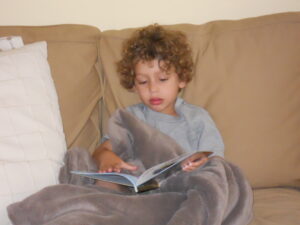 In the recent Education Week “Babies Are Saying Less Since the Pandemic: Why Schools Should Worry,” Early Head Start teacher explained, “It seems like a lot of our kids now are not where other kids have been. They’re not cooing and they’re not doing the things I have witnessed in the past. In the next years, as these kids are coming into school, it is going to be challenging because of just how different things have been.”
In the recent Education Week “Babies Are Saying Less Since the Pandemic: Why Schools Should Worry,” Early Head Start teacher explained, “It seems like a lot of our kids now are not where other kids have been. They’re not cooing and they’re not doing the things I have witnessed in the past. In the next years, as these kids are coming into school, it is going to be challenging because of just how different things have been.”
Yes …
Thanks to COVID’s prolonged school closures and mandates, most of us became homebodies living/working remotely, our kids attached one way or another to screens, too. Even our very youngest. Instead of being talked to, read to, and played with a lot, many got over-the top TV time, out of the way of busy, masked parents doing their best to juggle work and family life with no breaks and nowhere to go.
The consequences disturb.
Sean Deoni, director of the Advanced Baby Imaging Lab, tracked 1,700 Rhode Island families with infants and found that, one year into the pandemic, “the average cognitive performance (anything having to do with intellectual activity) of children three months to three years was the lowest it has been since researchers started to measure it in 2010…”
- On a scale of 140, toddlers, 16 months or younger, “expressive and receptive language scores fell from about 90 points in 2020 to 60 in 2021 on normalized assessments of verbal skills.”
- Pandemic-born babies had slower growth in white matter, the communication channels of the brain, vs. those born before COVID hit.
Says Deoni, “It’s not that they start off low and they’ll slowly get back to [normal], but [they] actually seem to be decreasing as time is going on… and this seems to be across the brain…, so that’s alarming.”
You bet.
Babies’ language skills develop via “conversational turn-taking” with adults. During the closure, such talk was masked, all-important facial expressions under wraps.
Moreover, Jill Gilkerson, language research director at the LENA Foundation, found that the drop in infants’ vocalizations was greatest in those from low-income families:
- Falling from the 50th percentile to the 25th percentile in frequency, and
- From the 45th percentile to the 25th “in the number of conversational exchanges they had with caregivers.”
This downward trend began even before the pandemic with stretched-too-thin, distracted parents who hooked their little ones up with toddler-designed apps, conversed less with them, relied on the simplest of books and the less engaging e-variety, too. They simply don’t focus children’s attention like reading to them from a hand-held print book.
That translates to trouble ahead. As Gilkerson put it: “The stark reality is that we are going to have a generation of children who are going to start less ready for school.”
And so it goes…
~ With my thanks and good 4th of July wishes, Carol